#Nature-based solutions (NBS) for carbon offsetting
Explore tagged Tumblr posts
Text
Embracing Nature-Based Solutions for Climate Change: A Sustainable Path to a Greener Future
In recent years, the urgency of addressing climate change has never been more critical. While traditional solutions have focused on reducing greenhouse gas emissions through technological innovation and policy reform, nature-based solutions (NBS) have emerged as an increasingly popular and effective method of mitigating the effects of climate change. These approaches harness the power of nature to address environmental challenges and provide a sustainable, cost-effective path forward.
What Is Nature-Based Solutions?
Nature-based solutions (NBS) refer to actions that work with or enhance natural processes to address climate change and its impacts. Unlike engineered or artificial solutions, NBS are designed to protect, restore, or sustainably manage ecosystems, leveraging nature’s inherent ability to capture and store carbon. These solutions include practices such as reforestation, wetland restoration, and soil carbon sequestration, all of which help absorb and reduce carbon dioxide (CO2) emissions from the atmosphere.
By supporting the restoration and conservation of natural ecosystems, nature-based climate solutions offer a dual benefit: they contribute to reducing greenhouse gas emissions while also increasing resilience to climate change impacts like flooding, extreme heat, and droughts.
Why Nature-Based Solutions Matter
Nature-based solutions play an essential role in the fight against climate change for several reasons:
Carbon Sequestration: Ecosystems like forests, wetlands, and mangroves act as carbon sinks. They absorb CO2 from the atmosphere and store it in plants, soil, and water. This natural carbon capture helps offset emissions from industrial activities and reduces the overall concentration of greenhouse gases in the atmosphere.
Biodiversity Conservation: By protecting natural ecosystems, NBS support biodiversity, ensuring that wildlife can thrive in healthy habitats. This, in turn, strengthens ecosystems' ability to provide critical services, such as pollination and clean water.
Cost-Effective: In many cases, nature-based solutions are less expensive than large-scale infrastructure projects. Protecting existing forests or restoring wetlands is often more affordable and can yield long-term environmental, social, and economic benefits.
Resilience to Climate Change: NBS improve the resilience of communities and ecosystems to the impacts of climate change. For example, wetlands act as natural buffers against floods, while forests help prevent soil erosion.
Nature-Based Carbon Credits: A Growing Market
One of the most innovative aspects of nature-based credits is their ability to generate carbon credits that can be traded on carbon markets. These credits are generated by activities like reforestation and the restoration of degraded ecosystems, which absorb or reduce CO2 emissions from the atmosphere.
Companies and organizations can purchase nature-based carbon credits to offset their own emissions, effectively supporting projects that mitigate climate change while contributing to global emission reduction targets. As demand for carbon credits rises, the market for these nature-based credits is growing, providing an economic incentive for businesses to invest in sustainable practices and environmental restoration.
The Role of Technology in Nature-Based Solutions
Technology plays a crucial role in optimizing and scaling nature-based solutions. Digital platforms and data analytics can help monitor the effectiveness of these projects, ensuring that they are achieving their carbon sequestration goals. For example, remote sensing technologies can track forest health, and machine learning algorithms can predict the outcomes of restoration projects.
Companies like SC Solutions are leveraging AI and technology to enhance the implementation of nature-based climate solutions. By providing real-time data and analytics, these companies help businesses make informed decisions about which projects to invest in and ensure that their efforts contribute to meaningful environmental change.
Conclusion
Nature-based solutions represent a vital tool in the global fight against climate change. By integrating natural systems into climate change mitigation strategies, we not only reduce carbon emissions but also build a more resilient and sustainable future. As the world shifts toward a low-carbon economy, embracing nature-based climate solutions and supporting the growing market for nature-based credits can unlock significant environmental, social, and economic benefits. Together, these solutions provide a sustainable pathway to combat climate change and preserve our planet for future generations. https://scsolutions.ai/
0 notes
Text
Use of ESG Investing
By considering ESG(Environmental, Social, and Governance) factors alongside financial metrics, investors can gain deeper insights into a company's long-term value, risk management practices. ESG investing can be used to construct investment portfolios that align with an investor's values and sustainability objectives.
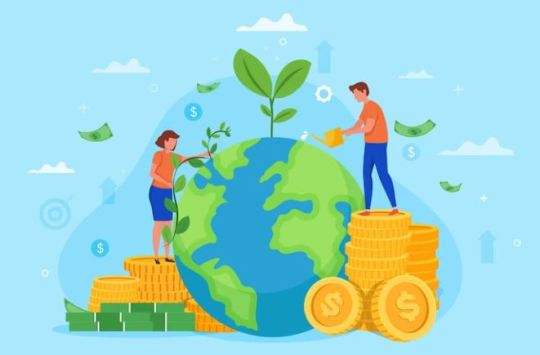
#Carbon Removal#Nature Based Solution (NBS)#Carbon Credit#Net Zero#Agro Forestry#Carbon Market#Carbon Trading#Electric Mobility#ESG#carbon footprint calculator#net zero emissions#net zero carbon emissions#carbon trading in India#carbon credit management#sustainable development goals#carbon footprint#carbon offsets#esg investing#carbon emission trading
0 notes
Text
Ambipar announces the signing of the partnership agreement with BP Carbon Trading Limited British Petroleum
Ambipar announces the signing of the partnership agreement with BP Carbon Trading Limited British Petroleum
Ambipar Participações e Empreendimentos SA informs its shareholders and the market in general that Biofílica Ambipar Environmental SA, a group company, has signed a Partnership Agreement with the company BP Carbon Trading Limited (“British Petroleum”) with the objective of forming a Joint Venture to promote, develop and operate nature-based solutions (NBS) carbon offset projects in…
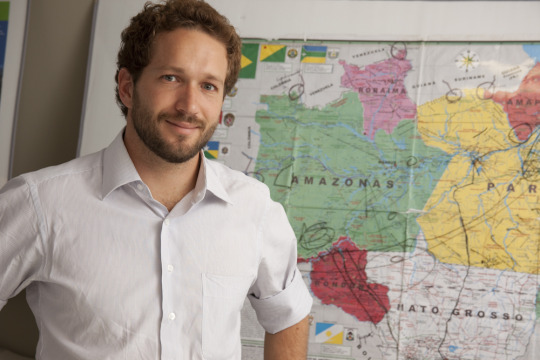
View On WordPress
#Ambipar Participações e Empreendimentos SA#Biofílica Ambipar Environmental SA#BP Carbon Trading Limited
0 notes
Text
Restaurant 1000 heralds McDonald’s Australia’s sustainable future
McDonald’s Australia has heralded a new era of sustainability by opening its 1000th restaurant as the company’s sustainability flagship for Australia.
As part of the project, WaterGroup has deployed its smart water metering solution into the flagship restaurant, forming one of 25 core sustainability initiatives the restaurant is using to reduce its environmental impact with the aim to test, evaluate and implement industry-leading sustainability innovations into the future.
“At WaterGroup, saving water for our customers is our top priority. We are so proud to assist McDonald’s with our state-of-the-art technology to achieve real savings,” WaterGroup Managing Director Guenter Hauber-Davidson said.
“Leaking pipes, leaky toilets, fixtures, valves or sprinklers are some of the typical causes of abnormally high water use. With our solution in place, the Melton South restaurant can quickly identify when these occur to save water and money.”
McDonald’s Australia National Director of Development Diana Grosmann said, “As a sustainability innovation hub, Restaurant 1000 will play a crucial role in enabling us to continue to design and build commercially practical sustainability solutions into every new Macca’s restaurant in the years to come.”
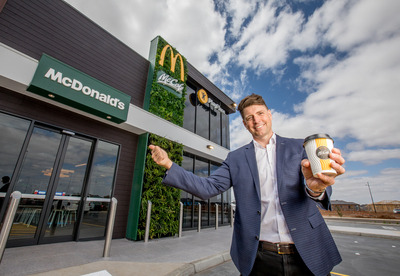
McDonald’s Australia Director of Supply Chain and Sustainability Kylie Freeland added, “Through collaboration with the franchisee of the restaurant, as well as partners like WaterGroup, we hope that Restaurant 1000 will allow us to learn quickly and expand successful innovation trials that enable us to continue to implement practices, equipment and products to improve our environmental impact.”
WaterGroup’s smart water metering solution comprises a smart NB-IoT-enabled logger that connects to a site’s existing water meter. The data from that meter is then sent to the cloud and is accessible via a client-facing portal. At Melton South they also have WaterGroup’s AWARE service, where the WaterGroup team monitor and alert the restaurant of unusual water usage turning insights into action.
During the 2019 financial year, WaterGroup has delivered measurable outcomes for its clients with water savings of almost 300 million litres and cost savings of more than $1 million.
“We wish the McDonald’s South Melton team great success with their new restaurant and look forward to saving them water and money,” Hauber-Davidson said.
Other sustainability initiatives
Restaurant 1000 customers will be served a series of new packaging items including paper straws, wooden cutlery and paper sundae cups, as McDonald’s Australia continues to phase out all plastic straws and plastic cutlery from its restaurants nationwide. The collective impact of these transitions will remove 860 tonnes of plastic from the McDonald’s system.
The restaurant will also incorporate energy-efficient air-conditioning systems, hydrocarbon equipment and a building monitoring system to help collectively reduce carbon emissions and energy used.
“Over the coming three years we plan to invest more than $500 million to open over 80 new restaurants across Australia, incorporating a range of core sustainability elements from Restaurant 1000, including PlayPlaces made with recycled content and energy-efficient equipment, as well as the use of 100% renewable energy at some restaurants.
“Through partnership with the franchisee of the restaurant, Ben Westover, we hope Restaurant 1000 will allow us to learn quickly and expand successful innovation trials, so we can continue to implement practices, equipment and products to improve our environmental impact,” Grosmann said.
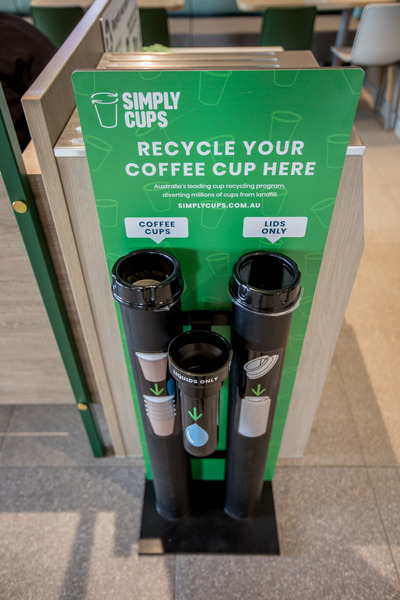
In early 2021, Restaurant 1000 will commence trialling a front-of-house waste recycling system, as the business moves towards achieving its goal of diverting front-of-house waste from landfill. The trial will see front-of-house waste from Restaurant 1000 recycled into carry out bags and wraps packaging.
Full list of sustainability initiatives implemented at Restaurant 1000
Building infrastructure and furnishings incorporating recycled content and natural aggregates.
With the help of Energy Australia, Restaurant 1000 will be powered entirely by renewable energy.
On-site solar panels installed on a custom roof structure over the drive-thru. The entire solar system at the restaurant is expected to generate 42,000 kWh per year.
Families will be able to introduce their children to recycling via a specially designed Happy Meal toy collection bin. Through our reverse logistics system, pre-loved Happy Meal toys will be returned to our distributor before being provided to a third party for recycling.
The PlayPlace equipment utilises old play equipment repurposed into new decks, climbers, slide tubes and window panels — 60% of the entire structure is sourced from old Macca’s play equipment, with the remaining 40% of material being 100% recyclable at end of life.
Carbon-neutral McDelivery via Uber Eats and DoorDash, where carbon credits will be used to offset the emissions from deliveries made from Restaurant 1000 for 12 months.
McDonald’s distributor will act as a consolidation for waste streams such as cardboard, cups, coffee grinds and soft plastics and return these to a central location, creating opportunities for circular economies.
All lighting and signage at Restaurant 1000 utilises LEDs, which use around 80% less energy than neon systems, meaning there’s less strain on the environment and electricity grid. LEDs also don’t include any toxic gases and are cleanly recycled.
The green wall at the entry to Restaurant 1000’s dining room, full of living plants that increase biodiversity, provides insulation and clean the air.
Wheel stops and kerbing throughout the drive-thru and car park are made from recycled cups and plastics. The wheel stops are made only from cups and plastics from McDonald’s restaurants and not only complete the loop for a circular economy, but are more hard-wearing than concrete alternatives.
Two electric vehicle charging stations provided by Evie Networks, and supplied by 100% renewable energy.
A bulk oil supply system that pumps bulk oil directly from the tanker into a plumbed tank in the restaurant, reducing the cardboard and plastic packaging, which would have previously been delivered each week.
Similar to the bulk oil supply system, the restaurant utilises a bulk milk system that will remove the need for approximately 1650 kg of plastic bottles from the restaurant.
Strategically placed sensors will monitor the amount of sunlight shining into the restaurant. If it’s a bright day, the sensors will automatically dim the lights in the dining room to conserve energy.
Hydrocarbon refrigerant equipment will vastly reduce the carbon footprint of the restaurant due to its low Global Warming Potential and Zero Ozone Depleting Potential.
A high-efficiency air-conditioning system that doesn’t generate as much heat and therefore doesn’t force the system to work as hard to cool. This means the air conditioning system is up to 32% more efficient than the minimum BCA-compliant system.
Paper straws, wooden cutlery, paper sundae cups and a new type of wrap that can be composted will all be trialled at the restaurant.
All irrigation on-site will utilise two 5000 L water tanks that collect and harvest rainwater.
Using specialist technology provided by WaterGroup, water usage will be monitored by a cloud-based system that will help to identify any anomalies so any leaks are addressed early.
The restaurant will also use a heat recovery hot water system that absorbs heat from the air-conditioning system to heat water. This system is more efficient than conventional water heaters and reduces greenhouse gas emissions.
All timber cladding is Programme for the Endorsement of Forest Certification endorsed.
A building-monitoring system will assist McDonald’s to optimise energy use while the restaurant serves customers. Any anomalies in the air conditioning, lighting and refrigeration system will trigger an alert so the restaurant can rectify immediately.
source http://sustainabilitymatters.net.au/content/sustainability/article/restaurant-1000-heralds-mcdonald-s-australia-s-sustainable-future-1251423762
from WordPress https://davidkent.home.blog/2020/12/14/restaurant-1000-heralds-mcdonalds-australias-sustainable-future/
0 notes
Text
Here a list of 100 ways we could fix our world for a healthier and greener future
you could save the world by:
approving ecocide as an international crime against humanity in the Rome Statute
handing subsidies to regenerative farms and organic products
promoting a circular economy
cutting subsidies to dairy farms
implementing a meat tax
reducing food waste through composting
making supermarkets donate their food waste to food banks
investing in hemp
making corporations pay for unacceptable overuse of freshwater sources
boycotting Amazon.com and opting for smaller retailers instead
implementing a carbon tax
subsidizing renewable energy
becoming a minimalist
going zero-waste
making cities greener by cutting cars and planting trees
encouraging foraging in cities
creating green roofs
dealing with faulty tube systems to avoid freshwater leaks
applying dynamic glass to buildings
eating plantbased
joining a Fridays for Future protest or Extinction Rebellion
offsetting your carbon-footprint
donating to ISA—Instituto Socio Ambiental, to protect the Amazon Rainforest
investing in CCU and CCS technologies
buying clothes from vintage & second-hand shops only
voting for candidates with a long-term view of the future and with strong climate targets
eating less fish or shark
increasing bicycle lanes in cities
improving railway lines
protecting existing forests and rainforests
harnessing ocean power for electricity
using a guppyfriend bag that traps microplastics
avoiding products with toxic chemicals
changing to a bank that does not finance petrol companies
using ocean savers to clean your home
encouraging your city to become a “15-minute city”
taxing companies that pollute the oceans through pesticide use
taxing pesticide companies like Monsanto
subsidizing biopesticide companies
learning how to live according to permaculture principles
conserving tropical peatlands and mangroves as they are huge carbon storers
promoting healthy soils
rewilding forests and lands
improving biodiversity conservation
boycotting palm oil
calling out greenwashers
making shark-derived squalene illegal
helping fishermen transition to diving operators
increasing marine protected areas
investing in cultured meat/fish
learning from indigenous practices to coexist with nature
protecting 30% of the oceans by 2030
updating the legal framework for International Seas
reusing old jars for storing food
using a menstrual cup instead of tampons
investing in vertical farming
purchasing from upcycled clothing brands
making tap water more accessible through drinking stations eg. like eau de Paris
forcing companies that produce a lot of plastic to pay for their own waste disposal eg. recycling or cleaning up the oceans
listening to environmental podcasts
meditating
spending quality time in nature
investing in bio-contributing packaging made from mushrooms
understanding the magical and healing powers of mushrooms in uniting humans to mother Earth
holding corporations accountable for their greenhouse gas emissions, whilst incentivizing green companies through loans and tax cuts
aligning your business with your values
building with green materials and innovative solutions: Carbon Architecture
installing a nebia shower in your home
teaching environmental studies in schools
expanding the green school concept
donating to agroforestry projects
buying from brands that have certifications eg. fair trade, GOTS
building e-highways
banning deep-sea mining
purchasing upcycled and eco-friendly furniture
buying from companies that sell “ugly” fruits & vegetables
banning naval sonar that makes whales killl themselves
subsidizing technology that could improve aviation
increasing a country’s NBS (Nature Based Solutions) to reach climate neutrality
Joining the Resistance
avoiding products with fishy supply chains eg. canned tuna
investing in insect farming for feed
banning microplastics in products eg. in toothpaste
using loose leaf tea only
avoiding single-use plastics
using a bidet instead of toilet paper
investing in agtech startups
purchasing refurbished tech instead
reselling your clothes online
buying less stuff
signing the petition to withdraw the CAP
encouraging big investors to drop Brazilian meat companies that are not transparent
sleeping outside every now and then
investing in waste to energy facilities outside of cities
increasing communal gardens and composts in cities
promoting a system of values based on cooperation and sustainability rather than on greed and constant growth
investing in ice911—the technology that could save the Arctic
realising that 100 corporations are responsible for 71% of greenhouse gas emissions
investing in innovative projects that can radically change our system
taking a permaculture design course at Ecoversity
1 note
·
View note
Text
Nature-Based Solutions to Climate Change: A Path Toward Sustainability
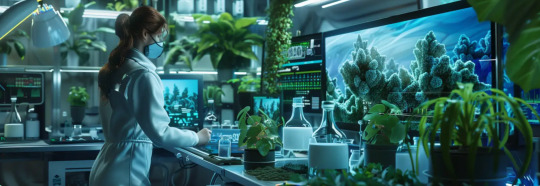
Nature-based solutions to climate change (NbS) are emerging as essential strategies to mitigate the impacts of global warming. These solutions involve the use of natural processes and ecosystems to address environmental challenges, promote resilience, and reduce carbon emissions. As the world faces increasingly severe climate change effects, NbS are gaining recognition for its potential to create sustainable, cost-effective, and long-term solutions for both the environment and communities.
What Is Nature-Based Solutions?
Nature-based climate solutions encompass a wide range of strategies that rely on nature’s ability to provide vital ecosystem services. These solutions include protecting and restoring ecosystems such as forests, wetlands, mangroves, and grasslands, which naturally regulate the environment and store carbon. The idea behind NbS is to harness the power of natural systems to address climate change, rather than relying solely on technological fixes or engineering solutions.
By supporting ecosystem restoration, enhancing biodiversity, and improving land management practices, nature-based solutions to climate change can significantly contribute to reducing the impacts of global warming. These solutions work by promoting carbon sequestration, improving water management, enhancing soil health, and creating buffers against extreme weather events.
The Benefits of Nature-Based Solutions
Carbon Sequestration: One of the primary benefits of nature-based solutions to climate change is their ability to capture and store carbon dioxide (CO2). Forests, wetlands, and other ecosystems act as carbon sinks, absorbing CO2 from the atmosphere. Projects like reforestation, afforestation, and the restoration of peatlands help increase the natural capacity to sequester carbon, contributing to the reduction of greenhouse gases in the atmosphere.
Biodiversity Conservation: Nature-based climate solutions also play a critical role in conserving biodiversity. By protecting and restoring ecosystems, these solutions help maintain habitats for countless species. Forests, wetlands, and coral reefs support biodiversity by providing shelter, food, and breeding grounds for wildlife. Preserving biodiversity is crucial for ecosystem stability and resilience, ensuring the continued availability of services such as pollination, pest control, and nutrient cycling.
Flood and Drought Protection: Wetlands, mangroves, and coastal ecosystems act as natural buffers against floods and storm surges, reducing the impact of extreme weather events. Forests and grasslands help regulate water flow and mitigate the risk of both floods and droughts by improving water retention in the soil. These natural solutions are often more cost-effective than traditional engineering methods, such as building dams or sea walls.
Cost-Effectiveness: Compared to traditional infrastructure, nature-based solutions to climate change are often more cost-efficient. Ecosystem restoration projects, such as planting trees or rehabilitating wetlands, can offer multiple benefits, including carbon storage, flood protection, and enhanced biodiversity, all while being more affordable than large-scale engineered solutions.
Nature-Based Solutions and Carbon Credits
Nature-based solutions carbon credits are an important part of the growing global carbon market. These credits are awarded to projects that reduce or capture carbon emissions through natural processes. By investing in NbS projects like reforestation or wetland restoration, companies and governments can earn carbon credits, which can be traded or sold to offset their emissions.
For example, a company might fund a reforestation project, which captures CO2 from the atmosphere as the trees grow. The carbon sequestered by the trees can then be quantified and converted into carbon credits, providing a financial incentive for environmental protection. This market-based approach helps scale up the implementation of nature-based solutions to climate change, supporting both climate mitigation efforts and economic growth.
Conclusion
Nature-based solutions to climate change represent a sustainable and impactful approach to addressing the climate crisis. By protecting and restoring ecosystems, we can enhance biodiversity, capture carbon, and build resilience to climate impacts. Nature-based solutions carbon credits provide a unique opportunity to finance and scale up these efforts, allowing businesses and governments to take responsibility for their emissions while supporting vital environmental projects. As the world continues to confront the challenges of climate change, embracing the power of nature will be key to achieving a sustainable, resilient future.
For more insights on nature-based solutions and their role in tackling climate change, visit https://scsolutions.ai/
0 notes
Text
Carbon Footprint Calculator For Business
The Carbon Trust offers a comprehensive online tool called the Carbon Footprint Calculator. It allows businesses to measure their carbon emissions across various scopes, including direct emissions from operations and indirect emissions from energy consumption.

#arbon Removal#Nature Based Solution (NBS)#Carbon Credit#Net Zero#Agro Forestry#Carbon Market#Carbon Trading#Electric Mobility#ESG#carbon footprint calculator#net zero emissions#net zero carbon emissions#carbon trading in India#carbon credit management#sustainable development goals#carbon footprint#carbon offsets#esg investing#carbon emission trading#environmental sustainability
0 notes
Text
#Carbon Removal#Nature Based Solution (NBS)#Carbon Credit#Net Zero#Agro Forestry#Carbon Market#Carbon Trading#Electric Mobility#ESG#carbon footprint calculator#net zero emissions#net zero carbon emissions#carbon trading in India#carbon credit management#sustainable development goals#carbon footprint#carbon offsets#esg investing#carbon emission trading#environmental sustainability
0 notes
Text
FcfIndia | Electric Mobility
FcfIndia, also known as Fair Climate Fund (FCF) India Pvt Ltd is an Indian company that focuses on electric mobility solutions and environmental sustainability. FcfIndia is indeed a player in electric mobility, they might be involved in areas such as electric vehicle manufacturing, charging infrastructure development, or providing related services. However, it would be advisable to verify the latest information about FcfIndia's activities and their involvement in the electric mobilities sector from reliable sources or the company's official website.

#carbon removal#Nature Based Solution (NBS)#carbon credits#net zero#Agro Forestry#carbon market#Carbon Trading#electric mobility#ESG#carbon footprint calculator#net zero emissions#carbon offsets#esg investing
1 note
·
View note